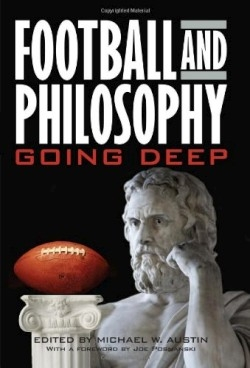Football and Philosophy
Going Deep
The comedian George Carlin has a classic routine in which he compares the gentle, pastoral game of baseball with football, which he describes in martial terms. “In football, the object is for the quarterback, also known as the field general, to be on target with his aerial assault, riddling the defense by hitting his receivers with deadly accuracy in spite of the blitz, even if he has to use shotgun,” Carlin tells his audience. “With short bullet passes and long bombs, he marches his troops into enemy territory, balancing this aerial assault with a sustained ground attack that punches holes in the forward wall of the enemy’s defensive line.”
Such violent imagery would understandably make some readers wonder about the curious symbiosis editor Michael Austin and a host of academician writers put forth in Football and Philosophy: Going Deep. Despite the variety of subject matter, the writers agree that football—whether on the high school, college, or professional level (the pressures of youth sports has its own set of considerations which are not addressed in this volume)—is a violent game, which is a great hook to draw in readers dubious about the connection.
The seventeen essays cover the gridiron gamut, from the idea of “trash talk” as a form of cheating to the use of performance enhancing drugs; from the mindset of winning as the sole acceptable outcome of the game to the role of friendship and sportsmanship; and from the superstars’ super-egos to the utilitarianism of salary caps.
Football and Philosophy is divided in four “quarters”— “Football’s Lessons for the Game of Life,” “Playing Well Between the Lines,” “Philosophical Armchair Quarterbacking,” and “Metaphysical Mojo”—each of which is ostensibly designed to zero in on a specific aspect of the game. Several of the essays, however, seem to be interchangeable among the chapters.
Among the highlights:
Daniel Gallagher wonders if Aristotle’s philosophy of friendship plays into the game on the field. Theoretically, yes; but in reality, only in circumstances that don’t impact negatively on an individual (think of two friends competing for the same spot on the roster, or who find themselves on opposite sides of the line of scrimmage).
“The True Nature of Cheating” engages the reader with its use of semantics as it poses various scenarios. Certain behavior might run contrary to the rules, Marshall Swain and Myles Brand aver, but “not all rule breaking is cheating.” On the other hand, a strict adherence to the rules, while faithfully following the letter of the law, is not always “ethical.”
In “They Don’t Pay Me to Be Humble” M. Andrew Holowchak observes the counterintuitiveness of individual stars with the concept of team play. The elite athlete might accrue spectacular statistics and undoubtedly his rushing yards or touchdown passes contribute to the overall success of his mates, but if it comes with an overly-inflated ego, as was the case with “Neon” Deion Sanders and Keyshawn Johnson, the locker room can become an uncomfortable place. “Like leeches on flesh, ego-puffed players feed off the numerical analysis to the extent that they care more for their own numbers than for their team or sport,” he writes. There may not be an “I” in “team,” but there certainly is an “E” in “ego.”
Returning to the military metaphor, purple-prose producing sportswriters often compare football players with the gladiators of ancient Rome. In one of the more entertaining essays, Heather L. Reid examines the similarities between these “combatants,” as well as their relationships with the people in the stands.
A few essays, such as Austin’s “Crowning a True Champion: The Case for a College Football Playoff,” seem to have little to do with the book’s overall theme. Similarly, Stephen Kershnar’s “A True MVP” (most valuable player), focuses on a topic of frequent debate, but can it really be considered a philosophical question? Such pieces, while interesting and entertaining, seem out of place. Another issue: these essays mirror what conditions could be like in an ideal world, a place rarely visited in the world of professional (and even high-level college) sports.
Anthologies such as Football and Philosophy are, by nature, frequently uneven. Having said that, each essay here is thought-provoking for reasons that might have little to do with philosophy per se, but are nevertheless worthy in their own right.
Reviewed by
Ron Kaplan
Disclosure: This article is not an endorsement, but a review. The publisher of this book provided free copies of the book to have their book reviewed by a professional reviewer. No fee was paid by the publisher for this review. Foreword Reviews only recommends books that we love. Foreword Magazine, Inc. is disclosing this in accordance with the Federal Trade Commission’s 16 CFR, Part 255.

